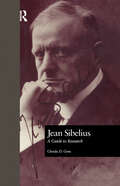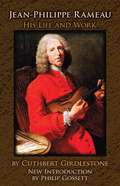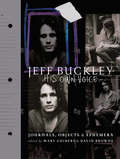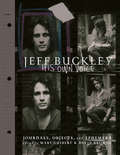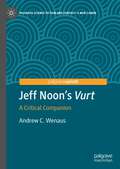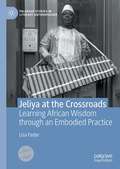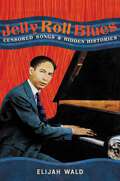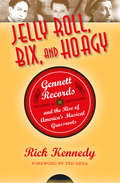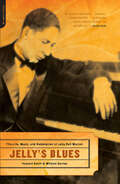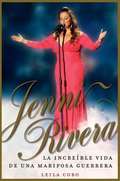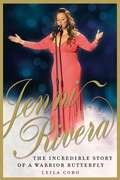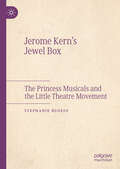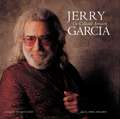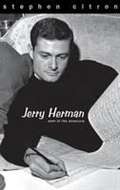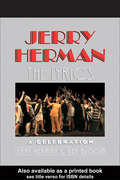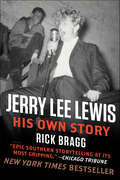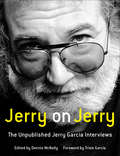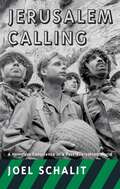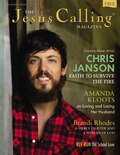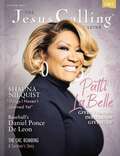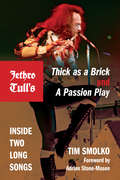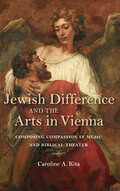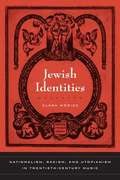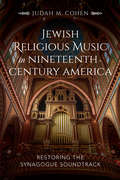- Table View
- List View
Jean Sibelius and His World (The Bard Music Festival #25)
by Daniel M. GrimleyNew perspectives on the greatest Finnish composer of all timePerhaps no twentieth-century composer has provoked a more varied reaction among the music-loving public than Jean Sibelius (1865–1957). Originally hailed as a new Beethoven by much of the Anglo-Saxon world, he was also widely disparaged by critics more receptive to newer trends in music. At the height of his popular appeal, he was revered as the embodiment of Finnish nationalism and the apostle of a new musical naturalism. Yet he seemingly chose that moment to stop composing altogether, despite living for three more decades. Providing wide cultural contexts, contesting received ideas about modernism, and interrogating notions of landscape and nature, Jean Sibelius and His World sheds new light on the critical position occupied by Sibelius in the Western musical tradition.The essays in the book explore such varied themes as the impact of Russian musical traditions on Sibelius, his compositional process, Sibelius and the theater, his understanding of music as a fluid and improvised creation, his critical reception in Great Britain and America, his "late style" in the incidental music for The Tempest, and the parallel contemporary careers of Sibelius and Richard Strauss.Documents include the draft of Sibelius's 1896 lecture on folk music, selections from a roman à clef about his student circle in Berlin at the turn of the century, Theodor Adorno's brief but controversial tirade against the composer, and the newspaper debates about the Sibelius monument unveiled in Helsinki a decade after the composer's death.The contributors are Byron Adams, Leon Botstein, Philip Ross Bullock, Glenda Dawn Goss, Daniel Grimley, Jeffrey Kallberg, Tomi Mäkelä, Sarah Menin, Max Paddison, and Timo Virtanen.
Jean Sibelius: A Guide to Research (Routledge Music Bibliographies)
by Glenda Dawn GossFirst Published in 1998. Routledge is an imprint of Taylor & Francis, an informa company.
Jean-Philippe Rameau: His Life and Work
by Philip Gossett Cuthbert GirdlestoneThe definitive biography and critical study of Jean-Philippe Rameau (1683-1764), this volume deals at length not only with the composer's musical achievements but also with aspects of his life and work that made him one of the most important cultural figures in eighteenth-century France. Fascinating incidents include his central position in a musical controversy that excited the enmity of Rousseau, Diderot, and the Encyclopedists; his friendship and collaboration with Voltaire; and his position as the author of a treatise on harmony that endured for two centuries.This critical evaluation focuses chiefly on Rameau's musical works, devoting entire chapters to his operas and ballets as well as his chamber music, cantatas and motets, and minor works. Additional topics include his links to Lully, his influence on Gluck, and the nature and importance of his acoustic and harmonic theories. Supplements include more than 300 musical examples, numerous useful appendices, indexes, an extensive bibliography, and a new Introduction by the distinguished musicologist and historian Philip Gossett.
Jeff Buckley: His Own Voice
by David Browne Mary GuibertThe journals, notebooks, musings, and early song drafts of Jeff Buckley, the late singer best-known for the definitive version of "Hallelujah" and his classic album Grace, including dozens of evocative photos of his personal effects and ephemera.After the release of his acclaimed debut album, Grace, in 1994, Jeff Buckley quickly established himself as one of the decade's most defining talents in pop music: a singer, guitarist, and songwriter with a multi-octave range whose tastes took in rock, blues, jazz, hardcore, Qawwali music, and even show tunes. Hailed by the likes of Bono, Jimmy Page, and Robert Plant, Grace showcased Buckley's voice, passion, and influences and pointed to an inordinately promising future. Three short years later, at the age of thirty, he tragically drowned in Memphis. But his legend and stature have only grown since; in recent years, everyone from Adele to Coldplay to Radiohead has spoken of the impact Buckley's music had on them.For much of his life, Buckley diligently kept journals recording his goals, inspirations, aspirations, and creative struggles. These diaries amount to one of the most insightful life chronicles any musical artist has left behind. Jeff Buckley: His Own Voice marks the first-ever publication of Buckley's handwritten account of his journey from his days in Los Angeles in the late '80s through shortly before his passing. Combined with reproductions of other memorabilia--including letters, notes, and unpublished lyrics--this book takes readers and fans deep into Buckley's mind and life.
Jeff Buckley: The Official Journals, Objects, and Ephemera
by David Browne Mary GuibertPRE ORDER NOW AND BECOME ONE OF THE FIRST TO READ THE OFFICIAL BIOGRAPHY OF THE LATE SINGER JEFF BUCKLEY. INCLUDES NEVER SEEN BEFORE HANDWRITTEN LYRICS, JOURNALS AND DIARIES.In 1994, an artist named Jeff Buckley released 'Grace', his debut album. Hailed immediately by the likes of Bono, Jimmy Page, and Robert Plant, as a singer, guitarist, and writer of a generation.Throughout his life, Buckley obsessively kept journals chronicling his goals, inspirations, aspirations, and creative struggles. His diaries amount to one of the most insightful life chronicles any musical artist has ever left behind. Jeff Buckley: His Own Voice will mark the first-ever publication of Buckley's account of his journey through his handwritten diaries and lyrics. Combined with reproductions of other memorabilia, including letters, notes, and unpublished lyrics - the book will take readers deep inside Buckley's creative mind and personal life. For those who grew up listening to Jeff's music and for those who are just discovering it, Jeff Buckley: His Own Voice will be an intimate portrait of one of the most influential musicians of the 20th century in his own extremely vibrant words and never seen before lyrics.
Jeff Noon's "Vurt": A Critical Companion (Palgrave Science Fiction and Fantasy: A New Canon)
by Andrew C. WenausThis book offers an examination of Jeff Noon’s iconoclastic debut novel, Vurt (1993). In this first book-length study of the novel, which includes an extended interview with Noon, Wenaus considers how Vurt complicates the process of literary canonization, its constructivist relationship to genre, its violent and oneiric setting of Manchester, its use of the Orphic myth as an archetype for the practice of literary collage and musical remix, and how the structural paradoxes of chaos and fractal geometry inform the novel’s content, form, and theme. Finally, Wenaus makes the case for Vurt’s ongoing relevance in the 21st century, an era increasingly characterized by neuro-totalitarianism, psychopolitics, and digital surveillance. With Vurt, Noon begins his project of rupturing feedback loops of control by breaking narrative habits and embracing the contingent and unpredictable. An inventive, energetic, and heartbreaking novel, Vurt is also an optimistic and heartfelt call for artists to actively create open futures.
Jeliya at the Crossroads: Learning African Wisdom through an Embodied Practice (Palgrave Studies in Literary Anthropology)
by Lisa FederThis book describes the remarkable culture of jeliya, a musical and verbal art from the Manding region of West Africa. Using an embodied practice as her methodology, the author reveals how she and her music teachers live “in between” local and global cultures. Her journey spans 20 years of fieldwork presented through personal and intimate stories, first as a student of the balafon instrument, then as a patron of the music. Tensions build in both the music and in social relations that require resolutions, underscoring the differences between two world views. Through balafon lessons, the author embodies values such as patience, courage, and generosity, resulting in a transformative practice that leads her to better understand her position vis-à-vis that of her jeli teachers. Meanwhile, jeliya itself, despite having been transmitted from teacher to student for 800 years, is currently in peril. Jelis cite modern globalized culture and people like the author herself as both a source of the problem as well as the potential solution.
Jelly Roll Blues: Censored Songs and Hidden Histories
by Elijah WaldA bestselling music historian follows Jelly Roll Morton on a journey through the hidden worlds and forbidden songs of early blues and jazz. In Jelly Roll Blues: Censored Songs and Hidden Histories, Elijah Wald takes readers on a journey into the hidden and censored world of early blues and jazz, guided by the legendary New Orleans pianist Jelly Roll Morton. Morton became nationally famous as a composer and bandleader in the 1920s, but got his start twenty years earlier, entertaining customers in the city&’s famous bordellos and singing rough blues in Gulf Coast honky-tonks. He recorded an oral history of that time in 1938, but the most distinctive songs were hidden away for over fifty years, because the language and themes were as wild and raunchy as anything in gangsta rap. Those songs inspired Wald to explore how much other history had been locked away and censored, and this book is the result of that quest. Full of previously unpublished lyrics and stories, it paints a new and surprising picture of the dawn of American popular music, when jazz and blues were still the private, after-hours music of the Black "sporting world." It gives new insight into familiar figures like Buddy Bolden and Louis Armstrong, and introduces forgotten characters like Ready Money, the New Orleans sex worker and pickpocket who ended up owning one of the largest Black hotels on the West Coast. Revelatory and fascinating, these songs and stories provide an alternate view of Black culture at the turn of the twentieth century, when a new generation was shaping lives their parents could not have imagined and art that transformed popular culture around the world—the birth of a joyous, angry, desperate, loving, and ferociously funny tradition that resurfaced in hip-hop and continues to inspire young artists in a new millennium.
Jelly Roll, Bix, and Hoagy: Gennett Records and the Rise of America's Musical Grassroots
by Rick Kennedy&“A lively and anecdotal history&” of the tiny family-run studio where jazz greats from Jelly Roll Morton to Louis Armstrong made their first recordings (Jazz Times). From 1917 to 1932, in a primitive studio next to the railroad tracks, the Gennett family of Richmond, Indiana, recorded some of the earliest performances of jazz, blues, and country greats—including Jelly Roll Morton, Big Bill Broonzy, King Oliver, Louis Armstrong, Gene Autry, Bix Beiderbecke, and native Hoosier Hoagy Carmichael (whose &“Stardust&” debuted on Gennett as a dance stomp). Jelly Roll, Bix, and Hoagy is the first thoroughly researched account of the people and events behind this unique company and its outsized impact on American music. Alive with personal details and anecdotes from musicians, employees, and family members, it traces the colorful history of a pioneer recording company.
Jelly's Blues: The Life, Music, and Redemption of Jelly Roll Morton
by Howard Reich William GainesJelly's Blues recounts the tumultuous life of Jelly Roll Morton (ca., 18851941). A virtuoso pianist with a larger-than-life personality, he composed such influential early jazz pieces as "King Porter Stomp" and "New Orleans Blues." However, by the late 1930s, he was nearly forgotten. In 1992, the death of an eccentric memorabilia collector led to the unearthing of a startling archive, revealing Morton to be a much more complex and passionate man than many realized. An especially immediate and visceral look into the jazz worlds of New Orleans and Chicago, Jelly's Blues is a definitive biography, a long overdue look at one of the twentieth century's most important composers.
Jenni Rivera (Spanish Edition)
by Leila CoboComo una estrella resplandeciente y fugaz, Jenni Rivera iluminó la vida de millones de personas, pero el cielo se la llevó antes de tiempo. Jenni Rivera: La increíble vida de una Mariposa Guerrera: Fotos a todo color La discografía de Jenni Rivera Lista Billboard de los ranking de las canciones de Jenni Entrevistas exclusivas Una biografía completa, entretenida y objetiva Escrita por una de las líderes de opinión de la música latina Jenni fue la artista latina más vendida dentro del género regional mexicano. Con un programa de radio semanal, su propio programa de telerrealidad, una línea de maquillaje y ropa y su propia fundación, estaba en la cima de su carrera y de su vida. Todo lo que había logrado con sangre, sudor, lágrimas y alegría iba, según ella misma decía, de la mano de Dios. Pero su vida, sus sueños y la alegría que le regalaba a millones, llegaron a un trágico final la madrugada del 9 de diciembre de 2012. En Jenni Rivera: La increíble vida de una Mariposa Guerrera, Leila Cobo --pianista, presentadora de televisión y directora ejecutiva del contenido y la programación latina de Billboard-- nos regala una biografía íntima y conmovedora sobre Jenni Rivera, la parrandera, la elegante, la gran diva, la amiga, la mamá y la abuela. Descubrirás los comienzos de la vida y la carrera de Jenni y los momentos emocionantes y a veces turbulentos que conformaron su persona y su espíritu. Como una luz que se apaga antes de tiempo, con la partida de Jenni no solo perdimos a la inolvidable, la reina de reinas, la mariposa guerrera, sino que se fue también una mujer valiente que no temía enfrentar los altibajos de la vida en busca de la felicidad. Jenni nos dejó un ejemplo de vida, que resonará por siempre en cada nota de su voz.
Jenni Rivera: The Incredible Story of a Warrior Butterfly
by Leila CoboLIKE A BLAZING SHOOTING STAR, JENNI RIVERA LIT UP THE LIVES OF MILLIONS OF PEOPLE, YET THE SKY SWEPT HER AWAY BEFORE HER TIME Jenni Rivera: The Incredible Life of a Warrior Butterfly: Full color photos The complete discography of Jenni Rivera Billboard lists of sales rankings of Jenni's songs Exclusive interviews A complete, entertaining, and objective biography Written by one of the country’s leading experts in Latin music Jenni Rivera was the top-selling artist within the Regional Mexican music genre. With a weekly radio show, her own reality show, a makeup and clothing line, and her own foundation, she was at the height of her career and life. Everything she had conquered, with blood, sweat, tears, and smiles, hap¬pened, as she said, with God leading her by the hand. However her life, her dreams, and the joy she shared with so many came to a tragic end just before dawn on December 9, 2012. In Jenni Rivera: The Incredible Story of a Warrior Butterfly, Leila Cobo-pianist, TV host, and Executive Director for Latino content and programming at Billboard-brings us Jenni Rivera’s intimate and moving biography, reflecting on the party girl, the elegant woman, the great diva, the friend, the mother, and the grandmother. Discover the humble beginnings of Jenni’s life and career, as well as the emotional and sometimes turbulent moments that defined her persona and spirit. Like a candle blown out before her time, we not only lost the "Unforgettable One,” the "Queen of Queens,” the "Warrior Butterfly,” we also lost a brave woman who fearlessly faced life’s ups and downs to attain the happiness she so fervently wanted for herself and her family. With Jenni’s departure, we celebrate a shining legacy that will forever reverberate within every note of her voice. .
Jerome Kern’s Jewel Box: The Princess Musicals and the Little Theatre Movement
by Stephanie RuozzoJerome Kern’s Jewel Box shows how the integration of spoken and sung performances in Kern's early musicals reveals new connections between musical theater scores and “straight” (spoken) theater. Kern’s scores are foundational to the American musical, and subsequent dramatic music would be unrecognizable without Kern’s innovations. This book argues that Kern’s scores for a group of musicals staged at the Princess Theatre embody a musical corollary to the Realist drama of the Little Theatre Movement. The umbrella term “Princess musicals” includes the four musicals that Jerome Kern composed for New York City’s Princess Theatre: Nobody Home (1915), Very Good Eddie (also 1915), Oh, Boy! (1917), and Oh, Lady! Lady!! (1918), as well as Leave It to Jane (1917), a musical conceived for the Princess. Each separate Princess musical bears distinct hallmarks of Little Theatre sensibility, and that these hallmarks are overwhelmingly represented in the sung/musical portions of the drama. The book’s first chapter explores the influences of WWI and the Little Theatre Movement on the American stage (legitimate and musical). The subsequent chapters are studies of the five so-called “intimate musical comedies” that resulted from Kern’s engagement with these influences. The case studies all demonstrate how the shows’ scores advance the same artistic aims voiced by prominent members of the Little Theatre Movement. Ultimately, this project leads musical theater historians to reconsider the place of musicals in relation to the legitimate theatre and the historiography we construct around the “integrated” musical.
Jerry Garcia: The Collected Artwork
by Insight EditionsMore than a musician, the Grateful Dead&’s founder Jerry Garcia was also a prolific artist who created hundreds of paintings, drawings, and prints. Get to know another side of this creative legend through his paintings and drawings, and through interviews with those who knew him best.Jerry Garcia: The Collected Artwork is an intimate, playful exploration of Jerry Garcia&’s artistic legacy and creative life. The book opens with a foreword by Grateful Dead percussionist Mickey Hart and features more than 100 full-color reproductions of Jerry's paintings, drawings, and prints—from pen-and-ink drawings to acrylics, watercolors, and digital media. With archival interviews and quotes from the likes of Bob Dylan, Patti Smith, Grace Slick, and Carlos Santana, and stunning photography of Jerry and his lifelong collaborators, this is at once a beautifully crafted art book and a celebration of Jerry Garcia as an artist and human being. 100+ IMAGES: Features more than 100 full-color reproductions of Jerry's paintings, drawings, and prints—from pen-and-ink drawings to acrylics, watercolors, and digital media EXCLUSIVE ESSAYS: Edited by April Higashi, art curator and archivist of the Jerry Garcia Estate, each chapter opens with a commentary on the art presented in the context of Jerry's life and times GO BEHIND THE STAGE: Explore candid photographs, interviews, anecdotes, and remembrances by key cultural figures and those closest to Jerry COMMENTARY FROM MUSIC&’S BIGGEST NAMES: Hear from Bob Dylan, Patti Smith, Herbert Gold, Baron Wolman, Jon Carroll, Paul Pena, Victor Moscoso, Carlos Santana, and Grace Slick as they recount their memories of Jerry Garcia PERFECT FOR ALL DEADHEADS: Fans of the Grateful Dead and Jerry Garcia can enjoy this deep exploration of Jerry&’s life as an artist
Jerry Herman: Poet of the Showtune
by Stephen CitronThis revealing and comprehensive book tells the full story of Jerry Herman's life and career, from his early work in cabaret to his recent compositions for stage, screen, and television. Stephen Citron draws on extensive open-ended interviews with Jerry Herman as well as with scores of his theatrical colleagues, collaborators, and close friends. The resulting book--which sheds new light on each of Herman's musicals and their scores--abounds in fascinating anecdotes and behind-the-scenes details about the world of musical theater. Readers will find a sharply drawn portrait of Herman's private life and his creative talents. Citron's insights into Herman's music and lyrics, including voluminous examples from each of his musicals, are as instructive as they are edifying and entertaining.
Jerry Herman: The Lyrics
by Ken Bloom Jerry HermanJerry Herman is one of Broadway's most celebrated composers and lyricists, this book includes early lyrics from Herman's first Broadway revues and shows, songs cut from his best-loved shows, and new lyrics.
Jerry Lee Lewis: His Own Story
by Rick BraggThe greatest Southern storyteller of our time tracks down the greatest rock and roller of all time—and gets his own story, from the source, for the very first time.The New York Times BestsellerOne of Rolling Stone’s 10 Best Music Books of the YearA monumental figure on the American landscape, Jerry Lee Lewis spent his childhood raising hell in Ferriday, Louisiana, and Natchez, Mississippi; galvanized the world with hit records like “Whole Lotta Shakin’ Goin’ On” and “Great Balls of Fire,” that gave rock and roll its devil’s edge; caused riots and boycotts with his incendiary performances; nearly scuttled his career by marrying his thirteen-year-old second cousin—his third wife of seven; ran a decades-long marathon of drugs, drinking, and women; nearly met his maker, twice; suffered the deaths of two sons and two wives, and the indignity of an IRS raid that left him with nothing but the broken-down piano he started with; performed with everyone from Elvis Presley to Keith Richards to Bruce Springsteen to Kid Rock—and survived it all to be hailed as “one of the most creative and important figures in American popular culture and a paradigm of the Southern experience.”Jerry Lee Lewis: His Own Story is the Killer’s life as he lived it, and as he shared it over two years with our greatest bard of Southern life: Rick Bragg. Rich with Lewis’s own words, framed by Bragg’s richly atmospheric narrative, this is the last great untold rock-and-roll story, come to life on the page.“An enthralling look at the birth of rock & roll and the ensuing life of its arguably most colorful exponent.” —Entertainment Weekly
Jerry on Jerry: The Unpublished Jerry Garcia Interviews
by Dennis Mcnally Trixie GarciaListen in on hours of revelatory conversations with Jerry Garcia, one of the most beloved and missed figures in the world of music, with JERRY ON JERRY. More than twenty years after his death, at too young an age, Jerry remains a cultural icon whose influence and legacy endure. Now, these never-before-heard interviews reveal a candid and poignant side of Jerry, as he speaks openly on everything from religion and politics to his personal life and his creative process. Carefully selected by former Grateful Dead publicist and the band's authorized biographer, Dennis McNally, and curated with the cooperation of the Jerry Garcia Family, JERRY ON JERRY marks the first time these insightful and intimate archival recordings have ever been made available to the public.Here, Garcia talks about what it was like growing up in the San Francisco Bay Area, his obsession with his first guitar, and his first encounters with early R&B, which had a profound and lasting impact on his music. After discussing his brief, but eye-opening stint in the army, Jerry offers up stories of his time spent as a student of the Beats, and his personal and reverent memories of Neal Cassady. He ponders what he sees as the complicated nature of LSD and the oppressiveness of government. He goes on to remember in detail the early days of the Dead, from their first gigs as the Warlocks and their days at 710 Ashbury Street, to the Monterey Pop Festival in 1967 and performing on the road with Jefferson Airplane. Throughout he breaks to opine on movies (one of his favorite subjects), to open up about his songwriting process and his prolific collaboration with Robert Hunter, and his admiration for a broad range of musicians from the Rolling Stones and Bob Dylan to Scotty Stoneman and Bill Keith. Dozens of rare family photographs, and other art and ephemera, many of which have never been seen before, are included here in a PDF. With an introduction written and read by Dennis McNally, and a foreword written and read by Trixie Garcia, Jerry's daughter, this audiobook is the ultimate complement to any collection. JERRY ON JERRY is one of the most revealing and unguarded portraits of the adored front man of the Grateful Dead and a true, long-awaited gift to his fans.
Jerusalem Calling: A Homeless Conscience In A Post-everything World
by Joel SchalitJerusalem Calling marks the emergence of a new breed of public intellectual. American by birth, Israeli by association, and homeless by conscience, Joel Schalit is uniquely qualified to blast all stereotypes of Jewish identity. Moving effortlessly from philosophical complexity to outrageous humor, Schalit’s writing, and his ability to critically interrogate everything from the religious right to punk rock to Middle Eastern politics provides a singular perspective on life in a post-everything age. This book signals the emergence of a new breed of public intellectual. Joel Schalit is a political scientist living in San Francisco, where he works as an editor of Chicago's Punk Planet magazine and UC Berkeley's online politics and culture journal, Bad Subjects. He is a regular contributor to the San Francisco Bay Guardian. Schalit co-edited and contributed to Bad Subjects: Political Education for Everyday Life (NYU Press, 1998).
Jesus Calling Magazine Issue 10: Chris Janson (The Jesus Calling Magazine)
by Sarah YoungThis edition of The Jesus Calling Magazine features country singer-songwriter Chris Janson sharing how God guides his life and career; former WWE & AEW wrestler Brandi Rhodes talks about her life path; American television personality and Dancing with the Stars finalist Amanda Kloots gives her personal story of losing her husband to COVID-19; and Reverend Run, founding member of the chart-topping hip hop group Run-DMC, explains how his marriage is based on old school love.The Jesus Calling Magazine is a companion resource to Sarah Young's New York Times bestselling devotional, which has impacted the lives of more than 40 million people. These stories of hope will inspire you and equip you with tools to strengthen your relationships with family, friends, and yourself.The Jesus Calling Magazine will encourage you through:Interviews with well-known artists, authors, and entertainers"Doing Good" feature, spotlighting non-profits and everyday heroes serving their community in the name of ChristMusic spotlight showcasing musicians and performers using their gifts for God's gloryPastor's Corner with inspiration words from leading Christian teachersEntertaining puzzles and games for the familyRead additional issues of The Jesus Calling Magazine and look for more life-changing, life-giving books from Sarah Young, including:Jesus ListensJesus AlwaysJesus Today
Jesus Calling Magazine Issue 11: Patti LaBelle (The Jesus Calling Magazine)
by Sarah YoungThe spring issue of The Jesus Calling Magazine includes an in-depth interview with the incomparable performer Patti LaBelle, read the incredibly moving story of survival and triumph by a victim of the Oklahoma City bombing, author Shauna Niequist explains how to "live lightly," GRAMMY-award winner Chiquis Rivera shares her faith, and meet songwriting brothers Brett and Brad Warren as they discuss addiction, loss, and recovery.The Jesus Calling Magazine is a companion resource to Sarah Young's New York Times bestselling devotional, which has impacted the lives of more than 40 million people. These stories of hope will inspire you and equip you with tools to strengthen your relationships with family, friends, and yourself.The Jesus Calling Magazine will encourage you through:Interviews with well-known artists, authors, and entertainers"Doing Good" feature, spotlighting non-profits and everyday heroes serving their community in the name of ChristMusic spotlight showcasing musicians and performers using their gifts for God's gloryPastor's Corner with inspiration words from leading Christian teachersEntertaining puzzles and games for the familyRead additional issues of The Jesus Calling Magazine and look for more life-changing, life-giving books from Sarah Young, including:Jesus ListensJesus AlwaysJesus Today
Jethro Tull's Thick as a Brick and A Passion Play
by Tim SmolkoSince the 1960s, British progressive rock band Jethro Tull has pushed the technical and compositional boundaries of rock music by infusing its musical output with traditions drawn from classical, folk, jazz, and world music. The release of Thick as a Brick (1972) and A Passion Play (1973) won the group legions of new followers and topped the Billboard charts in the United States, among the most unusual albums ever to do so. Tim Smolko explores the large-scale form, expansive instrumentation, and complex arrangements that characterize these two albums, each composed of one continuous song. Featuring insights from Ian Anderson and in-depth musical analysis, Smolko discusses the band's influence on popular culture and why many consider Thick as a Brick and A Passion Play to be two of the greatest concept albums in rock history.
Jewish Difference and the Arts in Vienna: Composing Compassion in Music and Biblical Theater (German Jewish Cultures)
by Caroline A. KitaThis study “brings to life a circle of writers and composers, with analyses of their major, minor . . . and forgotten works of Jewish music theater” (Abigail Gillman, author of Viennese Jewish Modernism).During the mid-19th century, the works of Arthur Schopenhauer and Richard Wagner sparked an impulse toward German cultural renewal and social change that drew on religious myth, metaphysics, and spiritualism. The only problem was that their works were deeply antisemitic and entangled with claims that Jews were incapable of creating compassionate art. By looking at the works of Jewish composers and writers who contributed to a lively and robust biblical theatre in fin de siècle Vienna, Caroline A. Kita shows how they reimagined myths of the Old Testament to offer new aesthetic and ethical views of compassion.These Jewish artists, including Gustav Mahler, Siegfried Lipiner, Richard Beer-Hofmann, Stefan Zweig, and Arnold Schoenberg, reimagined biblical stories through the lens of the modern Jewish subject to plead for justice and compassion toward the Jewish community. By tracing responses to antisemitic discourses of compassion, Kita reflects on the explicitly and increasingly troubled political and social dynamics at the end of the Habsburg Empire.
Jewish Identities: Nationalism, Racism, and Utopianism in Twentieth-Century Music
by Klara MoriczKlara Moricz scrutinizes concepts of Jewish identity and reorders ideas about twentieth-century "Jewish music" in three case studies: first, Russian Jewish composers of the first two decades of the twentieth century; second, the Swiss American Ernest Bloch; and third, Arnold Schoenberg.
Jewish Religious Music in Nineteenth-Century America: Restoring the Synagogue Soundtrack
by Judah M. CohenThis study of synagogue music in the United States in the second half of the nineteenth century “sets a high standard for historical musicology” (Musica Judaica).In Jewish Religious Music in Nineteenth-Century America: Restoring the Synagogue Soundtrack, Judah M. Cohen demonstrates that Jews constructed a robust religious musical conversation in the United States during the mid- to late-nineteenth century. While previous studies of American Jewish music history have looked to Europe as a source of innovation during this time, Cohen’s careful analysis of primary archival sources tells a different story. Far from seeing a fallow musical landscape, Cohen finds that Central European Jews in the United States spearheaded a major revision of the sounds and traditions of synagogue music during this period of rapid liturgical change.Focusing on the influences of both individuals and texts, Cohen demonstrates how American Jewish musicians sought to balance artistry and group singing, rather than “progressing” from solo chant to choir and organ. Congregations shifted between musical genres and practices during this period in response to such factors as finances, personnel, and communal cohesiveness. Cohen concludes that the “soundtrack” of nineteenth-century Jewish American music heavily shapes how we look at Jewish American music and life in the first part of the twenty-first century, arguing that how we see, and especially hear, history plays a key role in our understanding of the contemporary world around us. Supplemented with an interactive website that includes the primary source materials, recordings of the music discussed, and a map that highlights the movement of key individuals, Cohen’s research defines more clearly the sound of nineteenth-century American Jewry.

